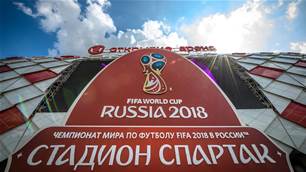He was the subject of a tabloid hate frenzy that would frighten Shane Warne but Cristiano Ronaldo floated above it all and kept on rising. Now he’s set his sights on silverware – for himself and United.
For England fans, it was the defining image of yet another World Cup finals failure. Not Wayne Rooney’s boot connecting with Ricardo Carvalho’s testicles, but the moment that immediately followed Rooney’s red card: Cristiano Ronaldo, turning to his own bench, smile playing across his lips, and winking.
Over the coming days, the image was splashed across the UK newspapers – tabloid and broadsheet – as England fans lashed out at their latest scapegoat. It didn’t matter that their team had underperformed throughout, that they had scraped past Paraguay, Trinidad and Tobago, and Ecuador. For Urs Meier in 2004, read Cristiano Ronaldo in 2006.
Four days later, in the semi-final against France, Ronaldo was booed every time he touched the ball, a cacophony of catcalls whistling down from the stands of Munich’s Allianz Arena. Yet Ronaldo seemed unaffected by the abuse he received; if anything, it spurred him on. That night, he was comfortably the best player on the pitch, a constant threat down the Portuguese left, eclipsing Zidane, Figo et al.
This season, back in Manchester, he’s demonstrated that same mental strength again, rejoining Rooney and his other United team-mates to take the title fight to Chelsea with a string of stirring displays that won him the Barclays Premiership Player of the Month award for both November and December to make him favourite for both the PFA Player of the Year and Footballer of the Year awards.
On the pitch, then, Ronaldo is remarkably unaffected by the events of last summer, yet the savagery of the attacks on him by certain sections of the English press have left their mark. He has, he says, become increasingly wary of what he says, steering clear of the tabloid press in particular whenever possible. In fact, he’s only agreed to break his silence and speak to FourFourTwo because he believes he will be shown in a fairer light by a “prestigious magazine”.
Fair, yes, but firm too – and we won’t dodge the controversial issues. The big question is: will he?
On a blustery winter’s day, Ronaldo certainly seems keen to make a good impression. Arriving at a hotel close to Manchester Airport for our interview, he looks every inch the superstar footballer: expensive-looking watch, diamond-encrusted ring, smart-casual clothes (jeans, shirt, jacket) and typically well-coiffured hair. Throw in the boy-band looks and the surprisingly imposing physique and you can see why he’s a favourite with the ladies.
Though there’s little sign of the pantomime villain portrayed in the tabloids, Ronaldo is certainly no shrinking violet. He speaks softly with a Madeiran twang, but the mischievous grin and twinkle in the eye are near-constants and when you put him in front of a camera, he really comes to life. “Can you wink?” asks the photographer. “Of course I can wink!” he replies and with that toothy smile, duly obliges.
After all the vilification from the English press and public (and even Steven Gerrard), it says a lot about Ronaldo’s personality that he can still laugh about the now infamous incident. Nevertheless, the question has to be asked: did he, or did he not, try to get Rooney sent off? And was the wink an acknowledgement that he’d achieved his goal, as was widely assumed?
“Everyone does what he has to do for his country and I did what I had to do,” he says. “Every player plays for his national team with great love and I was giving great love for Portugal. You don’t expect a thing like that to be used as an excuse for their defeat.”
In the aftermath, newspaper reports gleefully claimed Rooney was furious, ready to throttle his club team-mate as soon as he set eyes (and hands) on him. Yet insiders say Rooney greeted his adversary with a wink. How is their
relationship now? “It’s very good,” insists Ronaldo. “We were on opposite sides at the World Cup. There’s no problem. There are no personal differences. It’s all in the past. It’s not an issue, it’s gone and life goes on.”
The two young men have certainly been in devastating harmony this season, and though not all team-mates are the best of friends, it’s unlikely they’d have combined so effectively had they really been at loggerheads. Much of the credit for that must go to Sir Alex Ferguson, who nipped any potential problems in the bud as soon as the squad returned for pre-season training. “He spoke to both of us,” says Ronaldo. “He said that it had been something normal and that we should carry on as normal. I read what they were saying in the press and he said not to worry about it. We know the papers just want to cause controversy, to say this and that. It’s best not to pay any attention to it.”
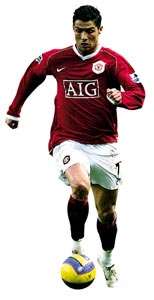 Ronaldo took a similar approach with opposing fans. “They have a go at you before and during games,” he says. “I’m aware of the booing, but I don’t pay any attention to it.”
Ronaldo took a similar approach with opposing fans. “They have a go at you before and during games,” he says. “I’m aware of the booing, but I don’t pay any attention to it.”
Then there were Gerrard’s comments: “How could he do that to a team-mate? It’s unbelievable. If one of my team-mates did the same, I’d never speak to them again.” Has Ronaldo received any special treatment or provocation from players looking to exact retribution on behalf of the nation? “No, I’ve not heard anything from players – I’ve rarely had problems of any kind with opponents.”
The last year has not been without its problems, however. Between the England game and his frosty reception on returning to these shores, he was hit by a hat-trick of difficulties. He suffered his own World Cup heartbreak when Portugal went down to France in the semi-finals. He had false rape allegations levelled against him. Worst of all, his father, Dinis, died. “It’s been a difficult year,” he says philosophically. “There are things that could have gone better and I’ve had to take a step back and look at them. I’ve had to see it through, but things have turned out well.”
So well, in fact, that his form for Manchester United arguably makes him the hottest player on the planet at present. Six months ago, no one – even Ronaldo – expected that.
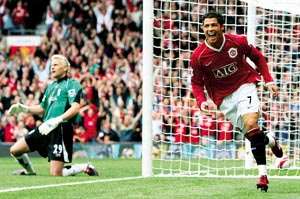
Last summer, Ronaldo was close to walking away from English football. “I should get out of Manchester,” he was quoted as saying. “The circumstances are not right. Nobody stood up for me. For some time I haven’t had any support from my chief executive [David Gill] or my coach [Sir Alex Ferguson]. They should have come out in my defence but no one did. My desire is to play in Spain. Will it be Real or Barcelona? It will be one of them.”
Back in the present, he tries to offer a considered explanation: “It was after the World Cup; I was hot-headed. We say things we don’t mean to say,” he says. “But it’s in the past. I’m at United, I’m happy and I want to continue.”
He denies even speaking to Barcelona and Real Madrid – “I’ve got a contract with United. If they speak to anyone it’s with my agent, not me. I told my agent I’m happy here and want to continue” – but does admit he’s a fan of Spanish football. “It’s a kind of football that attracts me, but at the moment I don’t want to leave here. I’ve been here for a while and every year I try to get
better and better. I’ve had to adapt to the culture, the football, the life and I think I’ve adapted well. It’s more or less what I expected to happen. I’m enjoying my career here.”
Yet questions remain about the likelihood of the boy from sunny Madeira remaining in rainy Manchester. It’s certainly the football, rather than the weather, or the food, that has helped him settle. “Of course life here is very different from in Portugal, but I was very well received by the players and it wasn’t a problem,” says Ronaldo. “I’m on good terms with everyone in the United team. There are three or four I get on best with, such as [Gabriel] Heinze and [Patrice] Evra and I get on quite well with [Rio] Ferdinand. They’re my friends in football, and away from football I’ve got my family, my cousins. I’ve got few friends, but the ones I’ve got are real friends.
“The United fans have also given me a lot,” he continues. “They’ve supported me whether we’ve played home or away, through good times and bad, and they still support me. It has been a big help.”
With Ronaldo, you feel it’s more than just a case of getting by with a little help from his friends, family and fans. Ask where he gets this extraordinary inner strength and supreme confidence from, though, and he’s the model of modesty. “I’ve coped with the pressure by working,” he says simply. “There are times when there really is a lot of pressure but I always try to feel good, be on form and concentrate on the game. It’s important to have belief in yourself and your ability, which I have.
“Football is something both mental and physical,” he continues. “There are days when you’re not good mentally and things don’t go so well, but it’s fundamental that you should be good physically on those days and vice-versa.”
Sounds simple. But really, how many players would be confident enough to grin broadly as they step up to take a potentially decisive penalty in a World Cup quarter-final shootout? “I tried to concentrate completely and do a good job,” says Ronaldo of his apparent total confidence. “I really wanted to score the goal and that was my only objective.”Accepted wisdom would have us believe that the genuinely great players are marked by a confidence bordering on arrogance, in which case Ronaldo is well on his way to greatness. But this season, he’s backed up the swagger with consistently brilliant performances. Which brings us to a big question: on current form, is he the best player in the world?
Manchester United team-mate Paul Scholes, himself enjoying an outstanding campaign, certainly thinks so: “The amount of goals and the amount of assists he’s had has been frightening. I haven’t seen anybody take players on, score goals and make goals like he has in the first half of the season, so he rightfully deserves that tag.”
Sir Alex agrees: “He’s the one player I’d love to pay money to go and see play. I’m sure Ronaldo is already in the ‘best in the world’ bracket. He’s only 21 and he will get even better. Cristiano has not just got quality, he has desire and a desire not to give in.”
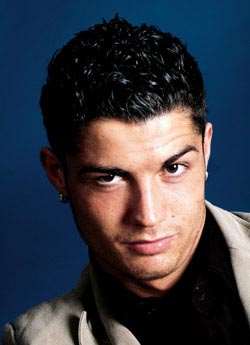
Perhaps the biggest difference between the callow youth who arrived in Manchester and the current vintage is what Scholes may be alluding to: these days, there is an end product, a cutting edge after the trickery. At international level, Ronaldo’s goal-scoring record is outstanding – with 15 in his 43 caps, he’s already the eighth highest scorer in Portugal’s history – but he had managed just 18 in three seasons for United prior to the current campaign, scant return for a player of such talent. This season he had 15 by the start of February, winning a £400 ($1000) bet he had with Ferguson about reaching that total for the entire season.
So having stated his ambition to be the best player in the world, has he reached the summit at the ripe old age of 21? “No. What I want is to be one of the best, but not the best. They’re things that happen naturally. I’m having a good phase and I hope to continue with my good form and maintain a high level in my career. I’ve improved every year and I want to be better still.”
What has been the difference this season? “I’ve worked hard, and we can see the result of that. I’ve become stronger mentally, as we saw at the World Cup and in the Champions League, and it’s gone very well.”
But for the goals to suddenly start flying in, he must have made a fundamental change? “I didn’t change anything,” he insists. “I just added to it. It’s more a case of using experience to apply your skills in a game. For example, choosing the moment to dribble, to pass, helping the team defend more. I’m more mature, more experienced, better tactically too. In a lot of aspects, I’m more mature. And I can put into practice the things we do on the training pitch. We work well as a unit and that’s why the team is doing so well.”For all this talk of teamwork, end product and maturity, what sets Ronaldo apart from almost every other player on the planet is his footwork, his trickery, his showmanship – all carried out at high speed. With Diego Maradona as his role model, it was these God-given attributes, honed on the streets of Funchal, which persuaded Sir Alex Ferguson to part with £12m ($30m) of Manchester United’s money in August 2003 to prise the 18-year-old from Sporting Lisbon.
Upon the recommendation of his Portuguese assistant, Carlos Quieroz, Ferguson had been watching Ronaldo for some time. The clincher came when this spindly kid ran United ragged in a friendly; even the arch pragmatist and renowned perfectionist Roy Keane insisted United sign the teenage box of tricks. “I had a good relationship with Keane,” recalls Ronaldo fondly, “and I was very pleased that a great player with a big name in football told the manager to sign me.”
But does the new, improved, more productive Ronaldo signal a scaling down of the trickery? He laughs. “It depends on a lot of things – the game, the situation. I want to always be useful to the team and give the most I can. That’s what I’m doing this season, it’s working and I want it to continue that way.”
Ironically, it is United’s ability to finally cope without Keane – and to a lesser extent Jaap Stam, David Beckham and Ruud van Nistelrooy – that has enabled them to mount a serious title challenge for the first time since they last won the league in 2003. This changing of the guard involving Nemanja Vidic and Michael Carrick, along with the form of Rooney, the resurgence of Scholes and, of course, the consistent brilliance of Ronaldo, has left Chelsea trailing in United’s wake. And unlike Jose Mourinho’s double champions, they’ve rarely scraped past teams, instead beating them convincingly. But as you would expect, Ronaldo is taking nothing for granted.
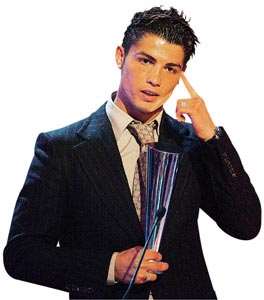
“We’ve got a good lead and the chances of winning the league this season are great, but nothing is guaranteed yet. Chelsea are a great team and we’re only halfway through the season. But we’re on the right path. We’re playing good football, we’ve been the most consistent team and if things continue that way, we can win the championship. My dream of winning the league is very much alive.”
The Premiership would complete the full set of domestic silverware for Ronaldo. Then what? The Champions League and a couple of player of the year awards? “I want to win all the trophies possible!” he smiles. “It could almost be the perfect year.”
After what threatened to be his annus horribilis, that would surely be enough to produce that mischievous grin again – if not another wink.
Over the coming days, the image was splashed across the UK newspapers – tabloid and broadsheet – as England fans lashed out at their latest scapegoat. It didn’t matter that their team had underperformed throughout, that they had scraped past Paraguay, Trinidad and Tobago, and Ecuador. For Urs Meier in 2004, read Cristiano Ronaldo in 2006.
Four days later, in the semi-final against France, Ronaldo was booed every time he touched the ball, a cacophony of catcalls whistling down from the stands of Munich’s Allianz Arena. Yet Ronaldo seemed unaffected by the abuse he received; if anything, it spurred him on. That night, he was comfortably the best player on the pitch, a constant threat down the Portuguese left, eclipsing Zidane, Figo et al.
This season, back in Manchester, he’s demonstrated that same mental strength again, rejoining Rooney and his other United team-mates to take the title fight to Chelsea with a string of stirring displays that won him the Barclays Premiership Player of the Month award for both November and December to make him favourite for both the PFA Player of the Year and Footballer of the Year awards.
On the pitch, then, Ronaldo is remarkably unaffected by the events of last summer, yet the savagery of the attacks on him by certain sections of the English press have left their mark. He has, he says, become increasingly wary of what he says, steering clear of the tabloid press in particular whenever possible. In fact, he’s only agreed to break his silence and speak to FourFourTwo because he believes he will be shown in a fairer light by a “prestigious magazine”.
Fair, yes, but firm too – and we won’t dodge the controversial issues. The big question is: will he?
On a blustery winter’s day, Ronaldo certainly seems keen to make a good impression. Arriving at a hotel close to Manchester Airport for our interview, he looks every inch the superstar footballer: expensive-looking watch, diamond-encrusted ring, smart-casual clothes (jeans, shirt, jacket) and typically well-coiffured hair. Throw in the boy-band looks and the surprisingly imposing physique and you can see why he’s a favourite with the ladies.
Though there’s little sign of the pantomime villain portrayed in the tabloids, Ronaldo is certainly no shrinking violet. He speaks softly with a Madeiran twang, but the mischievous grin and twinkle in the eye are near-constants and when you put him in front of a camera, he really comes to life. “Can you wink?” asks the photographer. “Of course I can wink!” he replies and with that toothy smile, duly obliges.
After all the vilification from the English press and public (and even Steven Gerrard), it says a lot about Ronaldo’s personality that he can still laugh about the now infamous incident. Nevertheless, the question has to be asked: did he, or did he not, try to get Rooney sent off? And was the wink an acknowledgement that he’d achieved his goal, as was widely assumed?
“Everyone does what he has to do for his country and I did what I had to do,” he says. “Every player plays for his national team with great love and I was giving great love for Portugal. You don’t expect a thing like that to be used as an excuse for their defeat.”
In the aftermath, newspaper reports gleefully claimed Rooney was furious, ready to throttle his club team-mate as soon as he set eyes (and hands) on him. Yet insiders say Rooney greeted his adversary with a wink. How is their
relationship now? “It’s very good,” insists Ronaldo. “We were on opposite sides at the World Cup. There’s no problem. There are no personal differences. It’s all in the past. It’s not an issue, it’s gone and life goes on.”
The two young men have certainly been in devastating harmony this season, and though not all team-mates are the best of friends, it’s unlikely they’d have combined so effectively had they really been at loggerheads. Much of the credit for that must go to Sir Alex Ferguson, who nipped any potential problems in the bud as soon as the squad returned for pre-season training. “He spoke to both of us,” says Ronaldo. “He said that it had been something normal and that we should carry on as normal. I read what they were saying in the press and he said not to worry about it. We know the papers just want to cause controversy, to say this and that. It’s best not to pay any attention to it.”
 Ronaldo took a similar approach with opposing fans. “They have a go at you before and during games,” he says. “I’m aware of the booing, but I don’t pay any attention to it.”
Ronaldo took a similar approach with opposing fans. “They have a go at you before and during games,” he says. “I’m aware of the booing, but I don’t pay any attention to it.”Then there were Gerrard’s comments: “How could he do that to a team-mate? It’s unbelievable. If one of my team-mates did the same, I’d never speak to them again.” Has Ronaldo received any special treatment or provocation from players looking to exact retribution on behalf of the nation? “No, I’ve not heard anything from players – I’ve rarely had problems of any kind with opponents.”
The last year has not been without its problems, however. Between the England game and his frosty reception on returning to these shores, he was hit by a hat-trick of difficulties. He suffered his own World Cup heartbreak when Portugal went down to France in the semi-finals. He had false rape allegations levelled against him. Worst of all, his father, Dinis, died. “It’s been a difficult year,” he says philosophically. “There are things that could have gone better and I’ve had to take a step back and look at them. I’ve had to see it through, but things have turned out well.”
So well, in fact, that his form for Manchester United arguably makes him the hottest player on the planet at present. Six months ago, no one – even Ronaldo – expected that.

Last summer, Ronaldo was close to walking away from English football. “I should get out of Manchester,” he was quoted as saying. “The circumstances are not right. Nobody stood up for me. For some time I haven’t had any support from my chief executive [David Gill] or my coach [Sir Alex Ferguson]. They should have come out in my defence but no one did. My desire is to play in Spain. Will it be Real or Barcelona? It will be one of them.”
Back in the present, he tries to offer a considered explanation: “It was after the World Cup; I was hot-headed. We say things we don’t mean to say,” he says. “But it’s in the past. I’m at United, I’m happy and I want to continue.”
He denies even speaking to Barcelona and Real Madrid – “I’ve got a contract with United. If they speak to anyone it’s with my agent, not me. I told my agent I’m happy here and want to continue” – but does admit he’s a fan of Spanish football. “It’s a kind of football that attracts me, but at the moment I don’t want to leave here. I’ve been here for a while and every year I try to get
better and better. I’ve had to adapt to the culture, the football, the life and I think I’ve adapted well. It’s more or less what I expected to happen. I’m enjoying my career here.”
Yet questions remain about the likelihood of the boy from sunny Madeira remaining in rainy Manchester. It’s certainly the football, rather than the weather, or the food, that has helped him settle. “Of course life here is very different from in Portugal, but I was very well received by the players and it wasn’t a problem,” says Ronaldo. “I’m on good terms with everyone in the United team. There are three or four I get on best with, such as [Gabriel] Heinze and [Patrice] Evra and I get on quite well with [Rio] Ferdinand. They’re my friends in football, and away from football I’ve got my family, my cousins. I’ve got few friends, but the ones I’ve got are real friends.
“The United fans have also given me a lot,” he continues. “They’ve supported me whether we’ve played home or away, through good times and bad, and they still support me. It has been a big help.”
With Ronaldo, you feel it’s more than just a case of getting by with a little help from his friends, family and fans. Ask where he gets this extraordinary inner strength and supreme confidence from, though, and he’s the model of modesty. “I’ve coped with the pressure by working,” he says simply. “There are times when there really is a lot of pressure but I always try to feel good, be on form and concentrate on the game. It’s important to have belief in yourself and your ability, which I have.
“Football is something both mental and physical,” he continues. “There are days when you’re not good mentally and things don’t go so well, but it’s fundamental that you should be good physically on those days and vice-versa.”
Sounds simple. But really, how many players would be confident enough to grin broadly as they step up to take a potentially decisive penalty in a World Cup quarter-final shootout? “I tried to concentrate completely and do a good job,” says Ronaldo of his apparent total confidence. “I really wanted to score the goal and that was my only objective.”Accepted wisdom would have us believe that the genuinely great players are marked by a confidence bordering on arrogance, in which case Ronaldo is well on his way to greatness. But this season, he’s backed up the swagger with consistently brilliant performances. Which brings us to a big question: on current form, is he the best player in the world?
Manchester United team-mate Paul Scholes, himself enjoying an outstanding campaign, certainly thinks so: “The amount of goals and the amount of assists he’s had has been frightening. I haven’t seen anybody take players on, score goals and make goals like he has in the first half of the season, so he rightfully deserves that tag.”
Sir Alex agrees: “He’s the one player I’d love to pay money to go and see play. I’m sure Ronaldo is already in the ‘best in the world’ bracket. He’s only 21 and he will get even better. Cristiano has not just got quality, he has desire and a desire not to give in.”

Perhaps the biggest difference between the callow youth who arrived in Manchester and the current vintage is what Scholes may be alluding to: these days, there is an end product, a cutting edge after the trickery. At international level, Ronaldo’s goal-scoring record is outstanding – with 15 in his 43 caps, he’s already the eighth highest scorer in Portugal’s history – but he had managed just 18 in three seasons for United prior to the current campaign, scant return for a player of such talent. This season he had 15 by the start of February, winning a £400 ($1000) bet he had with Ferguson about reaching that total for the entire season.
So having stated his ambition to be the best player in the world, has he reached the summit at the ripe old age of 21? “No. What I want is to be one of the best, but not the best. They’re things that happen naturally. I’m having a good phase and I hope to continue with my good form and maintain a high level in my career. I’ve improved every year and I want to be better still.”
What has been the difference this season? “I’ve worked hard, and we can see the result of that. I’ve become stronger mentally, as we saw at the World Cup and in the Champions League, and it’s gone very well.”
But for the goals to suddenly start flying in, he must have made a fundamental change? “I didn’t change anything,” he insists. “I just added to it. It’s more a case of using experience to apply your skills in a game. For example, choosing the moment to dribble, to pass, helping the team defend more. I’m more mature, more experienced, better tactically too. In a lot of aspects, I’m more mature. And I can put into practice the things we do on the training pitch. We work well as a unit and that’s why the team is doing so well.”For all this talk of teamwork, end product and maturity, what sets Ronaldo apart from almost every other player on the planet is his footwork, his trickery, his showmanship – all carried out at high speed. With Diego Maradona as his role model, it was these God-given attributes, honed on the streets of Funchal, which persuaded Sir Alex Ferguson to part with £12m ($30m) of Manchester United’s money in August 2003 to prise the 18-year-old from Sporting Lisbon.
Upon the recommendation of his Portuguese assistant, Carlos Quieroz, Ferguson had been watching Ronaldo for some time. The clincher came when this spindly kid ran United ragged in a friendly; even the arch pragmatist and renowned perfectionist Roy Keane insisted United sign the teenage box of tricks. “I had a good relationship with Keane,” recalls Ronaldo fondly, “and I was very pleased that a great player with a big name in football told the manager to sign me.”
But does the new, improved, more productive Ronaldo signal a scaling down of the trickery? He laughs. “It depends on a lot of things – the game, the situation. I want to always be useful to the team and give the most I can. That’s what I’m doing this season, it’s working and I want it to continue that way.”
Ironically, it is United’s ability to finally cope without Keane – and to a lesser extent Jaap Stam, David Beckham and Ruud van Nistelrooy – that has enabled them to mount a serious title challenge for the first time since they last won the league in 2003. This changing of the guard involving Nemanja Vidic and Michael Carrick, along with the form of Rooney, the resurgence of Scholes and, of course, the consistent brilliance of Ronaldo, has left Chelsea trailing in United’s wake. And unlike Jose Mourinho’s double champions, they’ve rarely scraped past teams, instead beating them convincingly. But as you would expect, Ronaldo is taking nothing for granted.

“We’ve got a good lead and the chances of winning the league this season are great, but nothing is guaranteed yet. Chelsea are a great team and we’re only halfway through the season. But we’re on the right path. We’re playing good football, we’ve been the most consistent team and if things continue that way, we can win the championship. My dream of winning the league is very much alive.”
The Premiership would complete the full set of domestic silverware for Ronaldo. Then what? The Champions League and a couple of player of the year awards? “I want to win all the trophies possible!” he smiles. “It could almost be the perfect year.”
After what threatened to be his annus horribilis, that would surely be enough to produce that mischievous grin again – if not another wink.
Related Articles
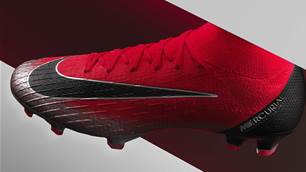
Nike’s last ever CR7 Chapters ‘Built On Dreams’ boot
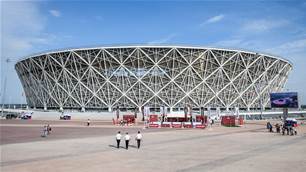
Deschamps says Mbappe is quicker than ex-Brazil star Ronaldo
